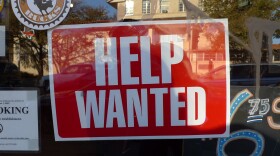The state Senate is expected to vote Thursday on a bill that would gradually increase the minimum wage in New Hampshire to $12 an hour by September of 2018.
New Hampshire currently has no minimum wage, effectively defaulting to the federal minimum wage of $7.25 an hour.
Massachusetts is now at $11/hour, Vermont is $10/hour, and Maine is at $9/hour. Here's a state=by-state breakdown of minimum wages.
The bill is not expected to clear the Republican-led Senate. One of the state Senators who says he’ll vote against it is Dan Innis. He’s a Republican from New Castle, and chairs the Senate Commerce Committee.
The former University of New Hampshire business school dean wrote an op-ed making the case that the markets should be left to set wages without government interference.
Sen. Donna Soucy, a Manchester Democrat, also wrote an op-ed, backing her bill and countering Innis' argument.
Innis joined NHPR's Morning Edition.
Every other New England state has increased its minimum wage beyond the federal rate so New Hampshire is now an economic outlier in the region. You say that’s a good thing – why?
It’s always good to be an economic outlier if you’re on the positive side of things. And I think in a lot of ways, that’s true in New Hampshire. In this case in particular, I think what we’ve seen in our state is that minimum wage jobs are decreasing in number, employers are increasing the pay rate for people that they’re hiring. You can’t drive past a McDonalds on the Seacoast without seeing a hiring sign at $10 an hour to start. And I think that’s in response to the low unemployment rate, heavy demand for employees, and a supply that has declined as the unemployment rate has declined.
You’re saying the economy is taking care of this?
Market forces are at work, and that’s the best of all worlds, I think.
If it’s so clear this is bad for the economy, why do you think so many other states in the region are moving in this direction?
It depends, and I think in every case, there’s a little bit of a different argument. But I look at it somewhat as taking a drug: it feels good at the moment, but the long-term effects can be negative. And it feels good to raise the minimum wage. The perception is we’re helping people, but in the long run, I’m not sure we are because the long-term effects of too much of an increase in the minimum wage is very negative for those folks on the lower end of the wage scale. You’ll see jobs phased out by technology, or in some cases, you’ll see businesses close because costs have done up too quickly.
You say in your op-ed that business owners are choosing to raise wages on their own, but do we know if that’s true?
You see it everywhere and there’s anecdotal data, there’s statistical data, it’s out there. Companies are not hiring very often at $7.25 an hour in our state, and if they are, it’s likely seasonal work and work that is great for high school and college students who are trying to make their way forward and get work experience.
But there is a portion of people who work these jobs who are older and may be working two or three jobs.
There are some, yes.
And the reality is they need those jobs and are wages going to keep up with inflation?
I think they will. I mean, look, when the minimum wage introduced, it was done by FDR, and I think it was 1938 at 25 cents per hour. Now if you adjust that for the CPI, that would put the minimum wage today somewhere between $4 and $5 an hour. You could also look at it another way, and instead of adjusting it to the Consumer Price Index, let’s adjust it to the Wage Increase Index from 1938 to 2016. If you do that, you come up with a number between $8.75 and $9 an hour for an equivalent minimum wage. So we’re real close to that, practically speaking.
But is that a living wage in this day in age?
Well, FDR said 25 cents an hour was a living wage back in 1938. So if you do the math, theoretically, it ought to be a living wage. On the other hand, I think that some sort of minimum is a reasonable thing for us to do. Now, is it $7.25 an hour? One could make the case it should be a little higher. I would listen to that case.
So if a bill was introduced that said maybe not $12 an hour, but let’s do it incrementally and say $9.25 over four or five years, you would look at that?
I would be willing to listen to something that is more gradual; smaller steps over a longer period of time. You’ve got to give businesses time to adjust to this.









